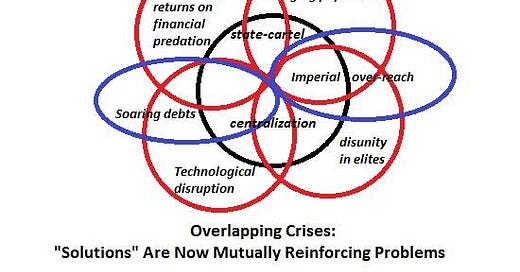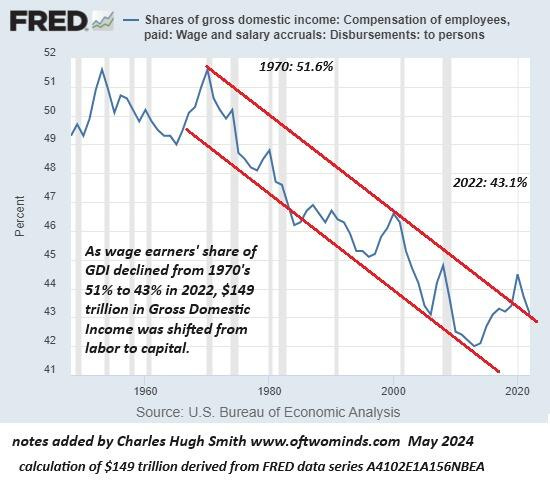I’ve been thinking about what Charles Hugh Smith has to say on this topic. He argues that things are getting so bad in America in terms of basic fairness—the rich keep getting richer and the rest keep getting gaslit—that rebellion may be in the cards. I have not reason to argue with his presentation of the situation
The Super-Wealthy Have A Problem
MONDAY, AUG 19, 2024 - 04:40 AM
Authored by Charles Hugh Smith via OfTwoMinds blog,
The less self-congratulatory camp of the super-wealthy understand the pressure cooker of inequality and unfairness is going to blow unless they relinquish some of their unearned gains generated by Fed policies.
but I’m not convinced that this will lead to rebellion in the near future. Unless. Unless the dominance of King Dollar takes a very serious hit that impacts life at home. I say that because in that event the cost of the stuff that we import would sky rocket.
In the meantime, while the rise of inequality and the lack of basic fairness in so many aspects of American life increases, with job and life prospects for young people withering, I’m not so sure we’ve reached a crisis point. One reason is that rebellions typically gain critical mass in the major urban areas. In America, however, the major urban areas are the strongholds of support for the regime. For the forseeable future—absent a collapse of King Dollar—those urban strongholds of the regime can be bought off.
Here’s a second reason. In our modern “democratic” system women vote. Women, statistically, skew toward looking to government for security—both financial and social. They look to government for solutions to the problems that government has caused. I know, go figure. It’s not that a large percentage of men don’t also, but statistical probabilities are what they are and there’s a reason why Dems pander strongly to women. And to the urban strongholds of the regime.
So, we can talk about the withering prospects for the future, the breakdown of law and order, the collapse of government finances, etc., but I’m just not convinced that we’ve reached the powder keg point. For the time being.
Nevertheless, Smith does present the financial dynamics in a relatively convincing way. He blames the Fed, in particular. That’s been a major part of the problem, but in some measure the Fed has also been reacting to government policies that set all this up—the financialization of the economy and the off shoring of industry was more than just the result of Fed policy. There were complex legal corporate and financial regulatory and tax policies that went into it and which were all about our elected representatives not actually representing the interests of We The People.
And then there are social collapse problems to consider: the collapse of fundamental education, of moral standards on a public scale, etc. Our representatives—including the legal establishment—colluded with the ruling class, and most of America bought into the narrative that the rich deserve to be rich. When I say “representatives,” I don’t mean simply the elected ones, but the judges, lawyers, clergy, educators—all those people who, in a healthy society, uphold the character and standards of healthy human being. That’s a result of America’s basic libertarian public ideology, which prevents the reforms we need so badly and has set our entire society on the slippery downward slope.
At any rate, here’s the basics of Smith’s argument. It’s not the whole picture, but if it’s not you still need to deal with it and decide what other factors to take into account. He starts by presenting the conventional wisdom that the super wealthy skate through hard times, then presents counter examples—times when the super wealthy took it in the neck. Then he gets to America, and this summer—with our Uniparty system on full display, especially in the open rigging of the Dem process (in which the GOPers have also been complicity over the decades of this century)—seems like a good time to consider Smith’s view:
So the super-wealthy don't always skate through tumultuous times, emerging richer than ever. We all understand how vast wealth inequality influences the political and social responses to crises. What is less well understood is the role of fairness in the social and political realms: if the inequality is understood to be the result of extremes of unfairness, the public mood darkens considerably, as humans are innately sensitive to unfairness.
The porousness of the border between the wealthy and the poor matters greatly in assessing fairness. If the financial-social membrane between the two classes is relatively porous, enabling the most ambitious and brightest of the poor to enter the ranks of the wealthy (or the ranks of the the top 10% who serve them), then the society maintains a minimum level of fairness that alleviates the pressure to overthrow the regime.
The remedial actions of the state also matter greatly. If the government acts decisively to raise estate taxes, taxes on unearned (i.e. rentier) income and on the higher reaches of earned income, and devotes some minimal attention to the basic needs of the bottom 90%, these policies also alleviate the pressure to overthrow the regime.
The book The Great Leveler: Violence and the History of Inequality from the Stone Age to the Twenty-First Century addresses these dynamics in admirable detail.
In other words, extremes of wealth/power inequality set the stage, but the closing act is decided by our responses to soaring inequality. If the response is PR artifice, i.e. the rich keep getting richer as the suffering of the bottom 90% increases, regime change starts looking like the only solution available.
If, on the other hand, policy makers and the public push back against the dominance of the super-wealthy, then the status quo can avoid fragmentation and dissolution.
The super-wealthy play a key role in this choice of response, and this fragments the elites into warring camps, a dynamic I've addressed many times over the years, including in my chart of some of the overlapping crises that will demand more than duct-tape responses:
The backdrop is the policies that have handed the super-wealthy immense gains in wealth and power via policy-driven asset appreciation and the gradual diminishment of the purchasing power of wages. Over the past 45 years, the value of earnings has declined $149 trillion to the benefit of unearned gains reaped by the already-wealthy:
This chart shows how wealth inequality has risen from the late 1970s, and how it was rocket-boosted by the Federal Reserve's "wealth effect" policies of quantitative easing (QE):
The bottom 80% own a mere fraction of the wealth owned by the top 1% and top 10%
While the wealthy cling to the self-serving narcissistic view that since we're doing fine, everyone's doing fine, the reality is the bottom 80% are awakening to the reality that they're not doing fine, a divide that will only widen as recession tightens its grip on the throats of the bottom 80%:
This is the vision of the "our wealth is rightly all ours" camp of the super-wealthy: the rest of us will own nothing and we'll be gloriously happy. Uh, sure. Since we're so happy, why don't we switch places?
The less self-congratulatory camp of the super-wealthy understand the pressure cooker of inequality and unfairness is going to blow unless they relinquish some of their unearned gains generated by Fed policies. While they naturally intend on keeping the vast majority of their gains, they realize the dividends of limitless greed might just be the overthrow of the regime they control to serve their own interests.









On the Zerohedge publication of Smith's essay I pointed out that the wealth of 1% and above is largely paper wealth siloed and never converted into goods and services- including the paper income it generates year after year. Any attempts to redistribute this paper wealth will cause it to be converted into goods and services setting off a hyper-inflation. This is the very nature of a financialized economy- the "wealth" isn't backed by production.
That’s how property taxes work in so many politically corrupted areas. The mortgage could be paid off, but the increasingly “greedy” government needs more and more. Hence, you wind up having to pay rent to the government in the form of taxes to keep the house. You don’t really own it. You are allowed to maintain it and live there as long as your landlord gets paid. Otherwise the sheriff shows up with weapons drawn to take it. Life, Liberty, Property? Huh?